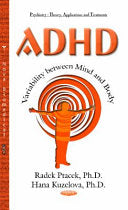Instant Download
Your unique download link appears right after you complete your purchase, and is also sent instantly to the email address you provided.
support@doctorbooks.online
Pediatrics Encyclopedia - up to 70% Off All Ebooks

Couldn't load pickup availability

Your unique download link appears right after you complete your purchase, and is also sent instantly to the email address you provided.
9781633214491, 1633214494
Hana Kuzelova, Radek Ptacek
Nova Science Publishers, Incorporated
January 1, 2015
112
Perseverative cognition is defined as the repetitive or sustained activation of cognitive representations of past stressful events or feared events in the future and even at non-clinical levels it causes a “fight-or-flight” action tendency, followed by a cascade of biological events, starting in the brain and ending as peripheral stress responses. In the past decade, such persistent physiological activation has proven to impact individuals’ health, potentially leading to somatic disease. As such, perseverative cognition has recently been proposed as the missing piece in the relationships between stress, psychopathology, and risk for health. Perseverative cognition is indeed a hallmark of conditions such as anxiety and mood disorders that are at increased -though still unexplained- cardiovascular risk. Although the pivotal role of ruminative and worrisome thoughts in determining the onset and maintenance of psychopathological disorders has been acknowledged for a long time, its effects on the body via reciprocal influences between mental processes and the body's physiology have been neglected. Moreover, perseverative cognition is definitely not restricted to psychopathology, it is extremely common and likely even omnipresent, pervading daily life. The objective of the Research Topic is to provide an interdisciplinary examination of cutting-edge neuroscientific research on brain-body signatures of perseverative cognition in both healthy and psychopathological individuals. Despite the evident role of the brain in repetitive thinking and the assumption that our mind is embodied, bran-body pathways from perseverative cognition to health risk have remained largely unexplored.
